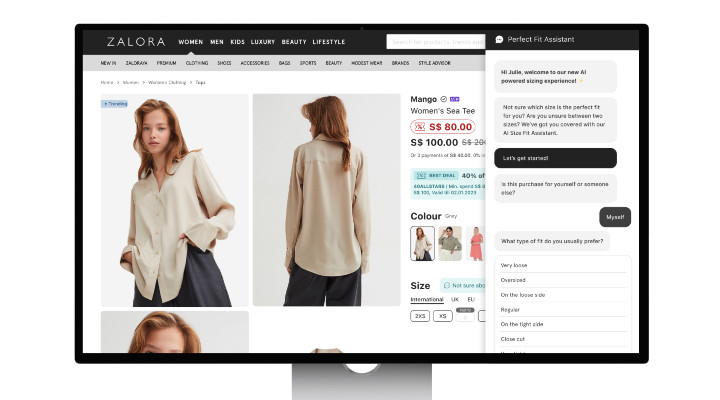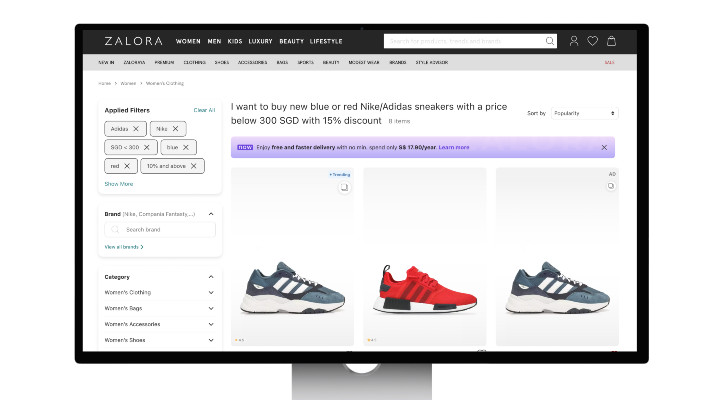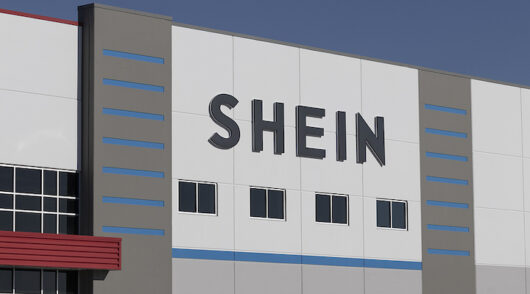In a transformative move for e-commerce in Southeast Asia, Zalora has unveiled an advanced integration with OpenAI via its proprietary platform, Titan.
OpenAI is the artificial intelligence (AI) research company behind generative AI chatbot ChatGPT. By leveraging its capabilities, Zalora aspires to reshape online shopping paradigms, streamline operations, and set new benchmarks for efficiency and productivity in the industry.
According to Sumit Jain, Zalora’s CTO, the company developed Titan, a proprietary integration of OpenAI, to address real-world e-commerce challenges and demonstrate its commitment to innovation.
Innovation matters
“It automates production services, improves search accuracy, and reduces manual efforts, leading to enhanced customer experience. It also enables more intelligent customer service through automated responses that leverage an understanding of customer needs,” he told Inside Retail.
Jain said this is an area where the full potential of AI in e-commerce is not yet fully realised. He sees opportunities in the production, product discovery, and post-purchase segments to elevate the customer experience through OpenAI.
“This initiative streamlines operations and keeps AI capabilities at a unified place, allowing us to scale use cases with lesser implementation effort and provide a more consistent customer experience,” he added.

A game changer
Jain believes that AI is a game-changer in the e-commerce landscape. It can trim operational costs, tackle complex business issues, and free up human support for more complex tasks.
“For example, we use AI to write better product descriptions, improve search accuracy, support customers post-purchase, and reduce production costs to name a few,” he noted.
The company has already demonstrated the efficacy of its search functionality through practical implementations, such as the inclusion of “Did you mean?” suggestions, designed to streamline consumers’ item searches.
Helping customers find more relevant products isn’t just good fro CX, it also directly leads to improvements in key performance metrics. For instance, Jain has observed a 4 to 6 per cent increase in conversion rates on the platform since the integration’s launch.
Operational efficiencies
The Titan solution has also demonstrated the ability to enhance operational efficiency through improved forecasting.
Early experiments have delivered a 30 to 50 per cent improvement in forecasting accuracy, allowing Zalora to scale more efficiently without wasting capacity in warehouse manpower.
“We have also started rolling out experiments in our production services to enrich product descriptions without the need for human effort. Early implementation of optimising how we take product images and using AI to reduce model costs and time-to-live has also started,” Jain stated.

Increased automation
The company is also using generative AI to automate its attribute tagging, such as colour, style, and occasion, from product images.
As a result, SKUs are automatically generated along with detailed product descriptions. This automation not only enhances search accuracy and eliminates hours of manual entry, but it also elevates the quality assurance of product offerings.
“Our AI-based tags have been broadly more accurate than manual tagging. They have also allowed us to get more detailed in our tagging without additional effort. This is because the AI is able to learn from the data it is given, and it becomes more accurate over time,” he elaborated.
This ensures that Zalora’s models are learning to further reduce manual efforts over time. As AI becomes more accurate, the team will be able to automate more and more of its production services, which will free up the team to focus on other tasks.
Business Intelligence
The company is also using this AI integration to power its business intelligence (BI) chatbots, which can perform data mining within the stored data and deliver quick and accurate analyses of key findings.
This process significantly reduces the time required to retrieve insights, enabling employees to reallocate their time toward higher-level tasks that drive the business forward.
“In addition to BI chatbots, we are also using ‘AI via Slack’ chatbots to manage customer service and system issues. These chatbots can answer frequently asked questions, resolve customer concerns, and provide recommendations on how to debug systems,” he stated.

It’s a brave new world
The company is also exploring the use of chatbots for other internal processes, such as expense claims.
Jain reiterated that Titan is just the beginning of the company’s journey of AI-driven innovation.
One of the biggest benefits of OpenAI technology is that it allows the company to innovate in-house, and generally at a far more affordable rate than third-party collaborations.
While he recognises the value of partnerships with third parties, which have been instrumental in improving the customer experience, Jain is also excited about the prospect of bringing more personalisation functionalities in-house.
“Overall, we believe that the best way to achieve our goals is to strike a balance between in-house development and third-party collaboration. This will allow us to innovate quickly and efficiently, while also leveraging the expertise of other companies,” he concluded.






